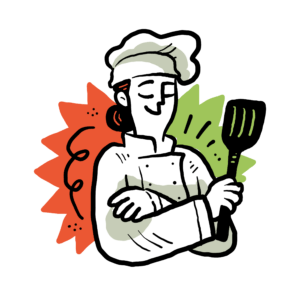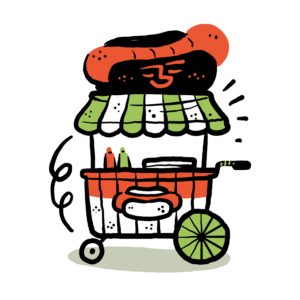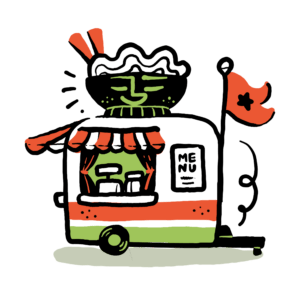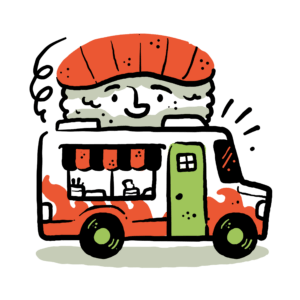California Workers Compensation Insurance for Food & Beverage Businesses
If you have employees on your payroll, you’re required to carry workers compensation insurance in California. Get the scoop on this essential coverage and learn how Food Liability Insurance Program (FLIP) can help you comply with The Golden State’s laws and shield you from the cost of lawsuits!
What Is Workers Compensation Insurance in California?
Workers compensation in California provides medical and financial support to employees who suffer job-related injuries or illnesses. It aims to provide two main benefits:
- Timely support for injured or ill employees through reimbursed medical, rehabilitative, and lost wage costs
- Financial protection for employers from workplace injury lawsuits
The Division of Workers Compensation (DWC) is a subsidiary of California’s Department of Industrial Relations (DIR). This group oversees workers compensation claims as well as disputes over benefits.
Who Is Required to Have Workers Compensation Insurance in California?
California’s workers compensation law requires any business with employees to carry this coverage. Even if you only have one employee, you need a workers compensation policy.
The following types of employees are eligible for workers compensation benefits from the state of California:
- Full-time (employees working 40+ hours per week)
- Part-time (employees working <40 hours per week)
- Temporary (employees hired for seasonal or short-term work)
Are Independent Contractors Covered Under My California Workers Compensation Policy?
If you hire independent contractors, you do not need this coverage because they are not considered employees under California workers compensation laws. However, it is very common for employers to mistakenly classify workers as independent contractors when they are technically employees, whether intentionally or unintentionally.
The best way to determine if your workers are independent contractors or employees is to conduct the ABC Test. This test assumes your workers are employees unless they meet these three criteria:
- The worker does the job independently, without being told how or when to do their work
- The work they do is not a regular part of your business’ main operations
- They have their own business doing this type of work for other clients, and not just your business
Which California Food & Beverage Businesses Need Workers Compensation Insurance?
If you have one or more employee(s) and run one of these businesses, you need workers compensation coverage.
FLIP offers online workers compensation coverage to all of the above businesses. Don’t see your industry listed here? We’re constantly expanding our coverage offerings! Contact us to speak with one of our licensed, non-commissioned customer service agents for more information about who qualifies.
How Does Workers Compensation Insurance Work in California?
You have the option to purchase this coverage through the state’s program or from a private insurer like FLIP.
Workers compensation insurance consists of two parts that work together to cover your employees and you in the event of a work-related injury. These parts are known as:
- Part One: Workers Compensation
- Part Two: Employers Liability
Part One: Workers Compensation
This part of your policy requires your insurance company to pay workers compensation benefits required by California if a work-related injury or illness happens. It covers costs you are legally required to pay, such as medical bills or lost wages.
Part Two: Employers Liability
Employers liability coverage kicks in to protect you if your employee sues you over a work-related injury or illness that isn’t covered by California’s workers compensation laws.
California law requires employers to carry a workers compensation policy that meets or exceeds the following limits:
- $100,000 per claim (occurrence)
- $100,000 per employee
- $500,000 per policy (aggregate)
What Information Will I Need About My Business to Get a Workers’ Comp Quote in California?
To prepare your quote, we need some information about your business, including:
- What type of business do you run
- Your Federal Employer Identification Number (FEIN)
- Your business’ address
- Your phone number
- Your employee payroll
- Your owner/office payroll (if you want to be included in the coverage)
Note: Please select the business class (e.g., food truck, concessionaire, etc.) that best describes your business when completing your application. It can take longer to get insured if you select the wrong class.
How Long Does It Take to Get Insured in California?
Most California food and beverage businesses can get a workers compensation quote from FLIP in about 10 minutes. If your business doesn’t qualify for an online quote, we’ll notify you during the application process and forward the details you provide to an underwriter to create your custom quote.
How Much Does Workers Compensation Insurance Cost in California?
Workers compensation premiums vary widely because the amount you pay is based on many different factors, including your payroll size and the types of workers you have.
At the end of your first policy year, FLIP conducts an audit to make sure your premium is still accurate and reflects your risk exposure. This audit compares the estimated payroll you provided at the start of the policy with your actual payroll for the year, as well as other factors that affect your premium.
After the audit, you may either be issued a refund or charged for additional premium. This is common for all workers compensation policies to ensure you aren’t overpaying or underpaying for coverage.
What Are Some Common Workers Compensation Claims in California?
Some of the most common incidents covered by workers compensation insurance include:
Slip-and-fall injuries
Example: An employee trips and falls while climbing into your food truck, breaking their wrist
Cuts and lacerations
Example: While dicing onions, your employee severely cuts one of their fingers and is unable to work while the injury heals
Burns and scalds
Example: One of your employees is scalded by hot oil from your deep fryer
Overexertion
Example: As they lift a 50-lb bag of flour, one of your employees pulls a back muscle
Musculoskeletal injuries from repetitive motions
Example: One of the chefs in your catering business develops tendonitis in their right wrist from repeatedly stirring ingredients
Hazardous material exposures
Example: An employee develops a lung condition from inhaling the fumes of an industrial cleaner you use on your equipment
What Does Workers Compensation Insurance Cover in California?
California provides several workers compensation benefits to injured or ill employees, such as:
- Medical care: Covers medical expenses related to your employee’s injury or illness, such as doctor visits, surgery, hospitalization, medications, physical therapy, and rehabilitation
- Temporary disability: Covers disability payments for employees who cannot return to work while healing from an injury or illness, which replaces two-thirds of their gross weekly wages up to a limit set each year
- Permanent disability: If your employee is permanently disabled from a work-related injury or illness, they may qualify for these benefits (depending on the severity of their disability, as determined by their doctor and a disability evaluator or judge)
- Job displacement: If your employee cannot return to their job and you can’t offer them a different position, they may be eligible for financial support to help them learn new skills and find a job
- Death benefits: Surviving family members and dependents of an employee who died may receive death benefits, such as funeral expenses
What Workers Compensation Doesn’t Cover
There are several incidents where employees may be hurt at work, but won’t be eligible for workers compensation benefits, including:
- Intentional injuries: An employee harms themselves on the job in an attempt to abuse the workers compensation system
- Injuries sustained while your employee was breaking the law: For example, an employee crashed your catering van and hurt themselves while they were driving intoxicated
- Injuries sustained while violating business policy: For instance, an employee disregards your policy mandating medical-grade masks when using certain cleaning chemicals and becomes sick from the fumes
Why Choose FLIP for Workers Compensation Insurance in California?
FLIP is committed to offering the best workers compensation coverage to California food and beverage businesses. Here’s how we do it:

Quick & Easy Application
Most business owners complete the 100% online application in 10 minutes or less. We make getting insured a piece of cake!
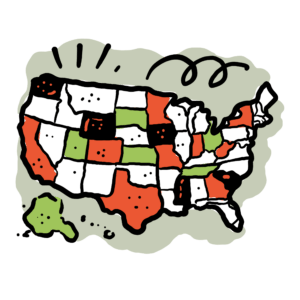
Meet (& Exceed!) State Requirements
Satisfy California’s employers liability minimums with $1,000,000 per occurrence, per employee, and per policy limits.

Flexible, Affordable Payment Options
With FLIP, you pick how you pay. Choose between annual, quarterly, semiannual, and monthly* options.

Convenient & Comprehensive
Bundle workers compensation with a general liability insurance policy. Customize it with a host of optional add-ons, like tools and equipment coverage.
*Monthly payments are only available for policies exceeding $1,000 per year.
What Our Customers Are Saying
Read about other food and beverage business owners’ experiences with FLIP from 300+ available reviews!
Yes, it can! When you fill out your application, you can include yourself in the policy to receive workers compensation coverage if you become hurt or ill due to your work activities. This is a great way to financially protect yourself, as many personal health insurance policies do not cover work-related injuries.
California’s 90-day rule requires the state claims administrator processing a workers compensation claim to accept or deny it within 90 days of the filing date. The claim is automatically accepted if they do not respond to the claim within this time frame.
The claims administrator is required to send a delay letter explaining any delays occurring while processing your claim that could affect the 90-day window.
Not carrying workers compensation insurance when you have employees is considered a misdemeanor in California. You may be fined no less than $10,000, face a prison sentence for up to a year, or both. The state can also issue additional penalties up to $100,000.
Yes. Even if your employees are related to you, California law requires you to carry workers compensation insurance.
As of 2023, SB 216 requires contractors to buy workers compensation coverage for themselves, even if they don’t have employees.
Until January 2026, this law only applies to certain professionals, like HVAC, concrete, and asbestos abatement contractors. After January 2026, it will expand to include all contractors unless they are classified as a joint venture and have no employees.
If you are a contractor purchasing workers compensation for yourself and no employees, select “0” as the number of employees on your payroll while filling out your application.
Filing a workers compensation claim in California involves several steps you must follow promptly:
- As soon as your employee reports their injury or illness to you, provide them with a claim form within one working day. You can download this form from the DIR’s Forms page. It’s available in several languages, including English, Spanish, and Vietnamese.
- Once your employee has filled out the “employee” section of the form, signed it, and submitted it to you, you must complete the “employer” section before sending it to FLIP.
- FLIP will respond to the claim within 14 days with an update on the status of your claim.
Both you and your employee should make copies of the claim form for your personal records.

